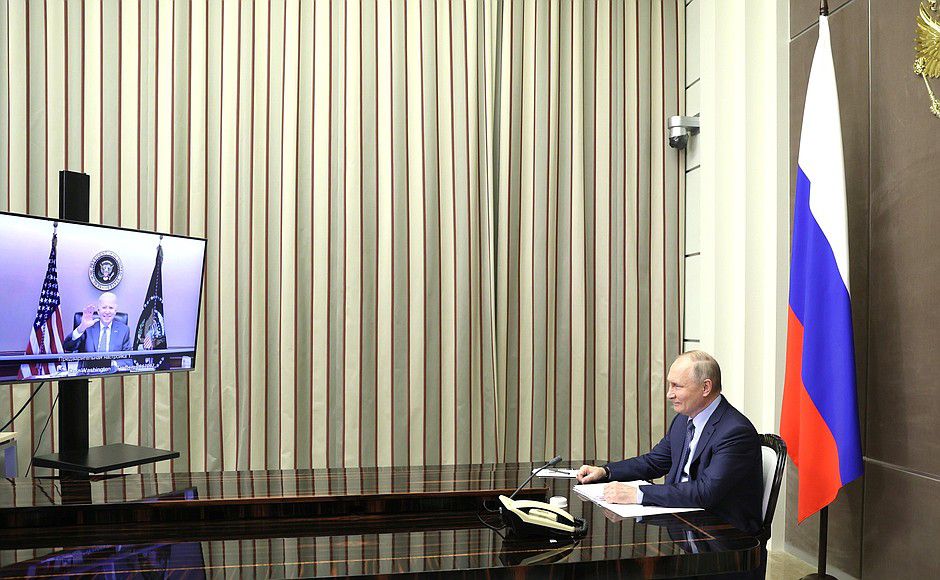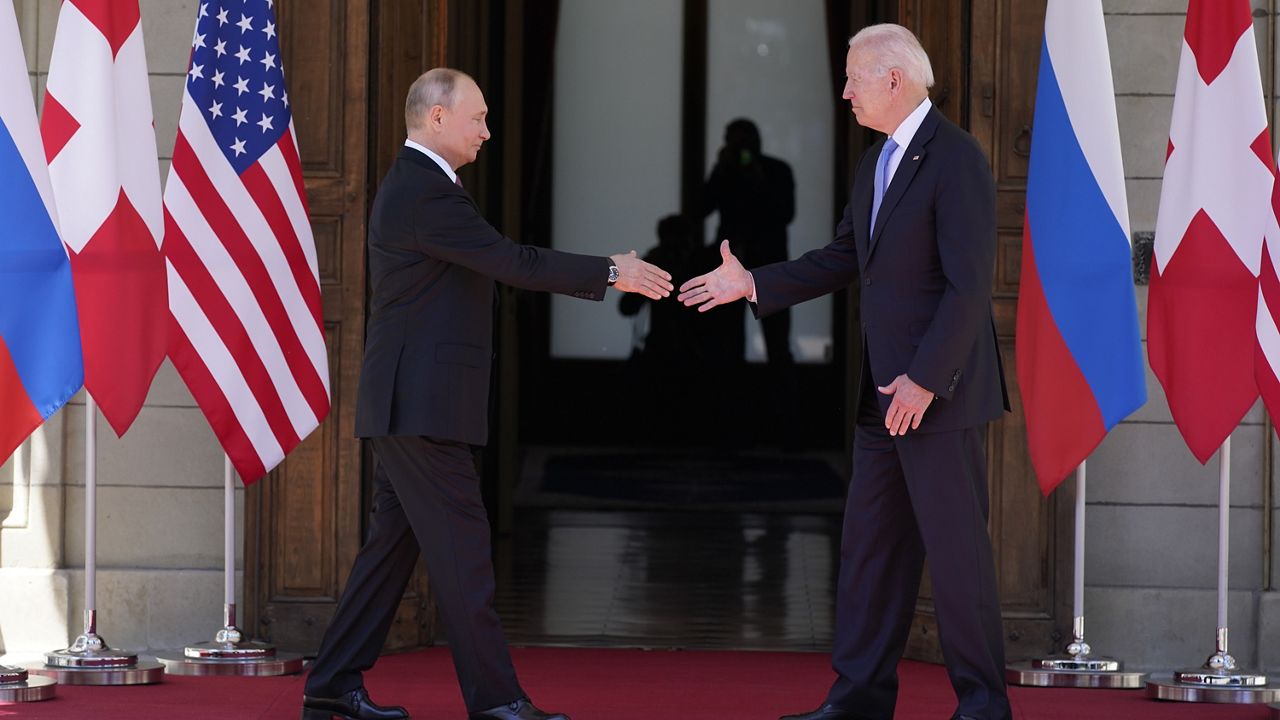President Joe Biden and Russia's President Vladimir Putin spoke for more than two hours in a high-stakes video meeting on Tuesday, their first face-to-face encounter since their summit in Geneva over the summer.
Biden "expressed deep concerns" related to "Russia’s escalation of forces surrounding Ukraine" warned Putin that the U.S. and its allies "would respond with strong economic and other measures in the event of military escalation," according to a White House readout of Tuesday's meeting.
The two greeted each other warmly, according to a snippet of the meeting released on Russian state television.
"I welcome you, Mr. President," Putin said to Biden.
"Good to see you again," Biden replied, before noting Putin's absence from October's Group of 20 summit in Rome.
“Unfortunately, last time we didn’t get to see one another at G-20,” Biden said. “I hope next time we meet to do it in person.”
The Kremlin released a photo of the meeting on Tuesday morning, signaling that the high-stakes virtual summit was underway.

The two leaders discussed "a range of issues on the U.S.-Russia agenda," according to the White House – in addition to Russia's actions in Ukraine, the two leaders also discussed Strategic Stability, ransomware and "joint work on regional issues such as Iran."
Biden reiterated his support for Ukraine's sovereignty and called for Russia to de-escalate tensions and return to diplomatic efforts.
"The two presidents tasked their teams to follow up, and the U.S. will do so in close coordination with allies and partners," the White House added.
The Kremlin described the meeting as "frank and professional," and said that Putin asked Biden for "assurances" that NATO will expand eastward to include Ukraine.
Under Secretary of State for Political Affairs Victoria Nuland told the Senate Foreign Relations Committee later Tuesday that Biden "could not have been clearer" about the consequences should Russia invade Ukraine.
National Security Advisor Jake Sullivan told reporters on Tuesday afternoon that Biden spoke with leaders from France, Germany, Italy and the United Kingdom after Monday's meeting with Putin to "debrief them on the call and consult on the way forward," adding that any action the U.S. might take would be "closely coordinated" with European allies.
"As we pursue diplomatic channels, we will also prepare for all contingencies, just as we have been doing for weeks now, including through the preparation of specific responses to Russian escalation, should they be required," Sullivan said.
Biden will speak with Ukranian President Volodymyr Zelenskyy on Thursday, Sullivan said.
While Sullivan said the administration is still under the impression that Putin had not yet decided whether or not to invade Ukraine, the president nonetheless “told President Putin directly that if Russia further invades Ukraine, the United States and our European allies would respond with strong economic measures.”
Possible punitive measures could include further economic sanctions to removal from an international financial system that moves money to thousands of banks around the world.
Biden spoke Monday evening with leaders from the U.K., France, Germany and Italy for an eleventh-hour discussion to coordinate messaging and potential economic sanctions ahead of Tuesday's call with Putin.
"The leaders discussed their shared concern about the Russian military build-up on Ukraine’s borders and Russia’s increasingly harsh rhetoric," according to a White House readout of the meeting. "They called on Russia to de-escalate tensions and agreed that diplomacy, especially through the Normandy Format, is the only way forward to resolve the conflict in Donbas through the implementation of the Minsk Agreements."
"The leaders underscored their support for Ukraine’s sovereignty and territorial integrity," the readout continued. "They agreed that their teams will stay in close touch, including in consultation with NATO allies and EU partners, on a coordinated and comprehensive approach."
Biden spoke with the European leaders on Tuesday after the call and briefed them on his conversation with Putin, according to a readout from the White House.
"The leaders underscored their support for Ukraine’s sovereignty and territorial integrity, as well as the need for Russia to reduce tensions and engage in diplomacy," the White House wrote. "They agreed their teams will stay in close touch, including in consultation with NATO allies and EU partners, on a coordinated and comprehensive approach"
Ahead of the call, Ukrainian officials alleged that Russia was sending tanks and snipers to the border with eastern Ukraine to "provoke return fire" and charged that the country was holding "training camps under the leadership of regular servicemen of the Russian Armed Forces."
A spokesperson for the Kremlin did not comment on these allegations and referred questions to Russia’s Defense Ministry, which did not yet respond to the charges.
The U.S. has also held “intensive discussions” with European allies to plan how they would collectively respond to a possible Russian incursion, an administration official said on Monday, previewing Tuesday's call.
"We believe that we have a path forward that would involve substantial economic countermeasures by both the Europeans and the United States that would impose significant and severe economic harm on the Russian economy, should they choose to proceed," the official said. "I'm not going to get into the specific details of that, but we believe that there is a way forward here that will allow us to send a clear message to Russia, that there will be genuine and meaningful and enduring costs to choosing to go forward should they choose to go forward with a military escalation in Ukraine."
Officials did not say whether President Biden would take direct military action against Russia, but said that he will make it clear to Putin that the U.S. is ready to support its allies should Russia take action to invade Ukraine.
"I think you could anticipate that in the event of an invasion, the need to reinforce the confidence and reassurance of our NATO allies and our eastern flank allies would be real, and the United States would be prepared to provide that kind of reassurance," the Biden administration official said," but did not specify what that form that "reassurance" would take.
"I don't want to use a public press call to talk about the particular sensitive challenges that President Biden will lay out for President Putin," the official continued.
"But I would say that the United States is not seeking to end up in a circumstance in which the focus of our countermeasures is the direct use of American military force, as opposed to a combination of support for the Ukrainian military, strong economic countermeasures, and substantial increase in support and capability to our NATO allies to ensure they remain safe."
Biden’s planned call with Putin comes after U.S. intelligence officials determined that Russia is planning a possible military offensive into Ukraine, which could begin as soon as early next year. News of the intelligence assessment was first reported Friday by The Washington Post.
U.S. intelligence officials have also determined Russia is planning to possibly deploy as many as 175,000 troops to Ukraine by January— nearly half of whom are already stationed along various points near the country’s border.
On Tuesday’s call, Biden “will obviously raise our concerns with Russia's military buildup and plans with respect to Ukraine,” this official added.
Biden will also press Putin on a number of other critical national security issues, including strategic stability, ongoing threats in cyberspace, and Iran's nuclear program.
“We have believed from the beginning of this administration that there is no substitute for direct dialogue for leaders,” the official said. “And that is true in spades when it comes to the U.S.-Russia relationship.”
The U.S. has also been in close contact with Ukrainian officials in the run-up to Tuesday’s meeting, and officials stressed that the administration plans to maintain that contact in the days and weeks ahead as the U.S. works to chart Putin’s next moves and thwart any potential Russian aggression.
"Secretary [of State Antony] Blinken will also be speaking with [Ukranian] President Volodymyr Zelenskyy in advance of the secure video call," White House officials said Monday. "And President Biden will talk to President Zelenskyy in the days following the call to be sure that he's able to read it out and also consult closely with the President of Ukraine."
U.S.-Russian tensions have been high in the run-up to this week’s call. Last week, Blinken warned that any Russian military action in Ukraine would trigger “high impact” sanctions that surpass any punitive measures that the U.S. has taken previously.
“We’ve made it clear to the Kremlin that we will respond resolutely, including with a range of high impact economic measures that we have refrained from pursuing in the past,” Blinken said.
President Biden on Friday said his administration is putting together he believes to be "the most comprehensive and meaningful set of initiatives to make it very, very difficult for Mr. Putin to go ahead and do what people are worried he may do."
These potential countermeasures from could include harsh economic sanctions against Russian oligarchs and close Putin allies, or sanctions on Russian energy producers and banks.
But there’s also the so-called nuclear option: Blocking Russia from SWIFT, the Belgium-based international payment system that moves money among thousands of banks around the world.
Russia is deeply reliant on SWIFT, and experts told The Associated Press that such a move would have a “devastating” effect on Russia’s economy, which “depends on oil and natural gas exports for more than one-third of its federal revenues.”
Earlier this year, the European Parliament approved a nonbinding resolution calling for Russia’s removal from SWIFT in the event Putin does invade Ukraine. But analysts have cautioned that a SWIFT cutoff would also cause indirect pain to Western economies, and could prompt possible retaliation from Russia.
Russian President Putin, for his part, is expected to seek a binding guarantee from Biden that Ukraine never be granted membership into NATO. The Kremlin said last week that it wants a “written guarantee” from the both the U.S. and other NATO members affirming as much.
These demands were quickly shot down by Biden and NATO Secretary General Jens Stoltenberg, however.
“It’s only Ukraine and 30 NATO allies that decide when Ukraine is ready to join NATO,” Stoltenberg said.
“Russia has no veto, Russia has no say, and Russia has no right to establish a sphere of influence trying to control their neighbors,” Stoltenberg added.
“I don’t accept anyone’s red line,” Biden said.
On Monday, Kremlin spokesman Dmitry Peskov said U.S.-Russian relations are in “a rather dire state,” but told reporters that the Kremlin looks forward to hearing what Biden has to say on the call.
“I think President Putin will hear these proposals with great interest. And we will be able to see how much these [proposals] would be able to defuse tensions,” Peskov said, speaking on Russia’s state TV station Channel One.
Tuesday's virtual meeting between the two leaders will be one of great geopolitical consequence, analysts say — with long-term implications that could determine not only the future of Ukraine, but also the stability of U.S.-Russian relations for years to come.
Ultimately, Russia’s military aggression and threats to Ukraine have “real, long-term implications for the security of the world. And that should concern all Americans,” said Max Bergmann, a senior fellow at the Center for American Progress focusing on Europe and Russia.
“This is sort of about the future of democracy in Europe, it's about the future of trajectory of democracy around the world,” he added.




